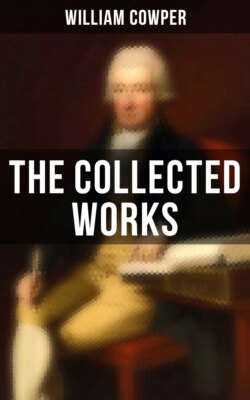Читать книгу The Collected Works - William Cowper - Страница 215
На сайте Литреса книга снята с продажи.
TO JOSEPH HILL, ESQ.
ОглавлениеTable of Contents
My dear Friend—Great revolutions happen in this ants' nest of ours. One emmet of illustrious character and great abilities pushes out another; parties are formed, they range themselves in formidable opposition, they threaten each other's ruin, they cross over and are mingled together,[170] and like the coruscations of the Northern Aurora amuse the spectator, at the same time that by some they are supposed to be forerunners of a general dissolution.
There are political earthquakes as well as natural ones, the former less shocking to the eye, but not always less fatal in their influence than the latter. The image which Nebuchadnezzar saw in his dream was made up of heterogeneous and incompatible materials, and accordingly broken. Whatever is so formed must expect a like catastrophe.
I have an etching of the late Chancellor hanging over the parlour chimney. I often contemplate it, and call to mind the day when I was intimate with the original. It is very like him, but he is disguised by his hat, which, though fashionable, is awkward; by his great wig, the tie of which is hardly discernible in profile, and by his band and gown, which give him an appearance clumsily sacerdotal. Our friendship is dead and buried; yours is the only surviving one of all with which I was once honoured.
Adieu.
W. C.
The sarcasm conveyed in the close of this letter, and evidently pointed at Lord Thurlow, is severe, and yet seems to be merited. It will be remembered, that Lord Thurlow and Cowper were on terms of great intimacy when at Westminster school, though separated in after-life; that Cowper subsequently presented him with a copy of his poems, accompanied by a letter, reminding him of their former friendship; and that his lordship treated him with forgetfulness and neglect. It is due, however, to the memory of Lord Thurlow, to state that instances are not wanting to prove the benevolence of his character. When the south of Europe was recommended to Dr. Johnson, to renovate his declining strength, he generously offered to advance the sum of five hundred pounds for that purpose.[171]
Nor ought we to forget Lord Thurlow's treatment of the poet Crabbe. The latter presented to him one of his poems. "I have no time," said Lord Thurlow, "to read verses; my avocations do not permit it." "There was a time," retorted the poet, "when the encouragement of literature was considered to be a duty appertaining to the illustrious station which your lordship holds." Lord Thurlow frankly acknowledged his error, and nobly redeemed it. "I ought," he observed, "to have noticed your poem, and I heartily forgive your rebuke:" and in proof of his sincerity he generously transmitted the sum of one hundred pounds, and subsequently gave him preferment in the church.
